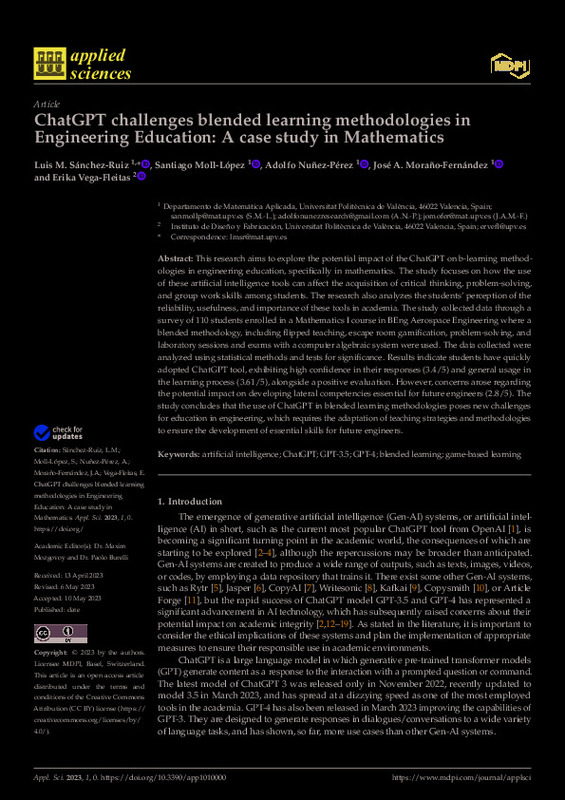JavaScript is disabled for your browser. Some features of this site may not work without it.
Buscar en RiuNet
Listar
Mi cuenta
Estadísticas
Ayuda RiuNet
Admin. UPV
ChatGPT Challenges Blended Learning Methodologies in Engineering Education: A Case Study in Mathematics
Mostrar el registro sencillo del ítem
Ficheros en el ítem
| dc.contributor.author | Sánchez Ruiz, Luis Manuel
|
es_ES |
| dc.contributor.author | Moll López, Santiago Emmanuel
|
es_ES |
| dc.contributor.author | Núñez-Perez, Adolfo
|
es_ES |
| dc.contributor.author | Moraño Fernández, José Antonio
|
es_ES |
| dc.contributor.author | Vega-Fleitas, Erika
|
es_ES |
| dc.date.accessioned | 2024-04-16T18:02:32Z | |
| dc.date.available | 2024-04-16T18:02:32Z | |
| dc.date.issued | 2023-05-14 | es_ES |
| dc.identifier.uri | http://hdl.handle.net/10251/203532 | |
| dc.description.abstract | [EN] This research aims to explore the potential impact of the ChatGPT on b-learning methodologies in engineering education, specifically in mathematics. The study focuses on how the use of these artificial intelligence tools can affect the acquisition of critical thinking, problem-solving, and group work skills among students. The research also analyzes the students' perception of the reliability, usefulness, and importance of these tools in academia. The study collected data through a survey of 110 students enrolled in a Mathematics I course in BEng Aerospace Engineering where a blended methodology, including flipped teaching, escape room gamification, problem-solving, and laboratory sessions and exams with a computer algebraic system were used. The data collected were analyzed using statistical methods and tests for significance. Results indicate students have quickly adopted ChatGPT tool, exhibiting high confidence in their responses (3.4/5) and general usage in the learning process (3.61/5), alongside a positive evaluation. However, concerns arose regarding the potential impact on developing lateral competencies essential for future engineers (2.8/5). The study concludes that the use of ChatGPT in blended learning methodologies poses new challenges for education in engineering, which requires the adaptation of teaching strategies and methodologies to ensure the development of essential skills for future engineers. | es_ES |
| dc.description.sponsorship | This research was supported by Technical University of Valencia (UPV), "Convocatoria A + D, Proyectos de Innovación Mejora Educativa, grant number PIME/21-22/284". | es_ES |
| dc.language | Inglés | es_ES |
| dc.publisher | MDPI AG | es_ES |
| dc.relation.ispartof | Applied Sciences | es_ES |
| dc.rights | Reconocimiento (by) | es_ES |
| dc.subject | Artificial intelligence | es_ES |
| dc.subject | ChatGPT | es_ES |
| dc.subject | GPT-3.5 | es_ES |
| dc.subject | GPT-4 | es_ES |
| dc.subject | Blended learning | es_ES |
| dc.subject | Game-based learning | es_ES |
| dc.subject.classification | MATEMATICA APLICADA | es_ES |
| dc.title | ChatGPT Challenges Blended Learning Methodologies in Engineering Education: A Case Study in Mathematics | es_ES |
| dc.type | Artículo | es_ES |
| dc.identifier.doi | 10.3390/app13106039 | es_ES |
| dc.relation.projectID | info:eu-repo/grantAgreement/UPV//PIME%2F21-22%2F284/ | es_ES |
| dc.rights.accessRights | Abierto | es_ES |
| dc.contributor.affiliation | Universitat Politècnica de València. Escuela Técnica Superior de Ingeniería del Diseño - Escola Tècnica Superior d'Enginyeria del Disseny | es_ES |
| dc.description.bibliographicCitation | Sánchez Ruiz, LM.; Moll López, SE.; Núñez-Perez, A.; Moraño Fernández, JA.; Vega-Fleitas, E. (2023). ChatGPT Challenges Blended Learning Methodologies in Engineering Education: A Case Study in Mathematics. Applied Sciences. 13(10). https://doi.org/10.3390/app13106039 | es_ES |
| dc.description.accrualMethod | S | es_ES |
| dc.relation.publisherversion | https://doi.org/10.3390/app13106039 | es_ES |
| dc.type.version | info:eu-repo/semantics/publishedVersion | es_ES |
| dc.description.volume | 13 | es_ES |
| dc.description.issue | 10 | es_ES |
| dc.identifier.eissn | 2076-3417 | es_ES |
| dc.relation.pasarela | S\494293 | es_ES |
| dc.contributor.funder | Universitat Politècnica de València | es_ES |








